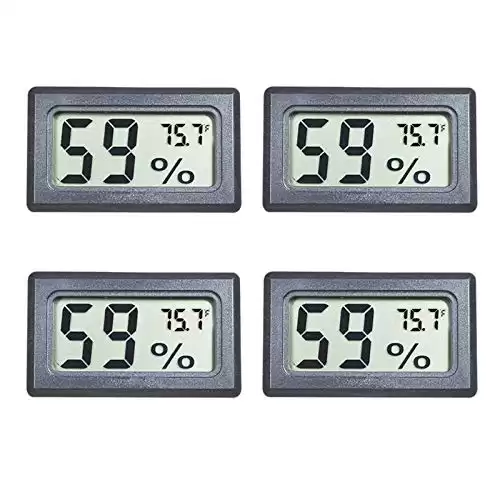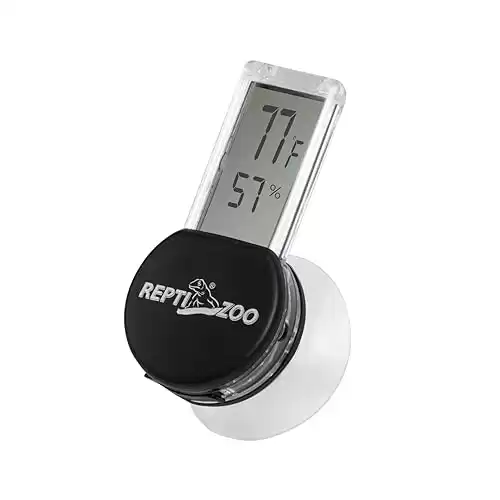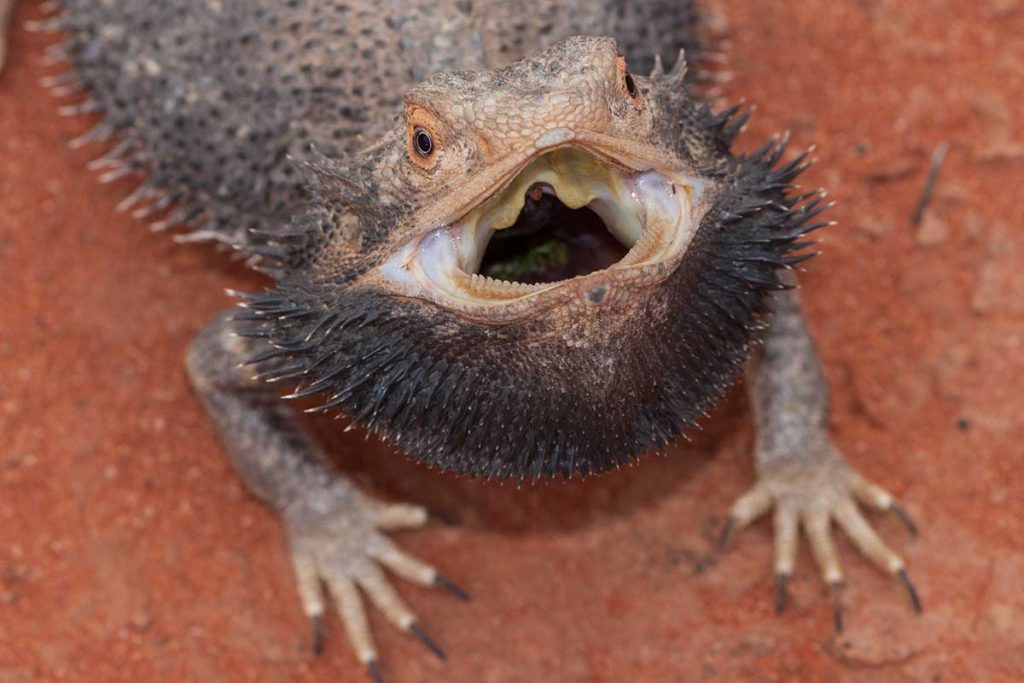
Hearing your bearded dragon coughing can be really alarming for a beardie owner. When your bearded dragon coughs, it is usually a sign that you need to make changes to your tank set up or it could even be a sign of more serious health issues.
Read on to learn more and find out how you can spot what’s behind your pet dragon’s cough and nurse your beardie back to health.
7 Causes of Coughing in Bearded Dragons
Bearded dragons cough for many of the same reasons that humans do. It could be one of the signs of illness and they may be sick and have excess mucus in their lungs, their nose may be running, or there could simply be something ‘tickling’ the back of their throat.
If your bearded dragon is coughing, then it is likely due to one of six common causes related to bearded dragon care: their enclosure temperature is too high or low, the humidity is not right, the substrate is causing irritation, their enclosure is dirty, their diet is wrong, or they are feeling stressed.
Ask the Expert
Ask The Expert

Why is my bearded dragon coughing
Hearing your beardie make cough-like sounds could mean a lot of things. Beardies don’t usually ‘cough’ except if there is a problem or when they experience discomfort. This is demonstrated by shaking of the head and making sounds that sound like cough, sneezing or gagging. A harmless cough could occur immediately after eating or drinking which does not pose any harm. Every beardie wants to wake up in the morning, eat and bask in the evening, but when the heat is too much or the temperature is too low, they become uncomfortable. This imbalance in the tank setup could make your beardie cough to ease off. A cough becomes persistent if the bearded dragon has a respiratory tract disease. Factors like wrong tank temperature, humidity and gagging caused by food or bedding materials do not pose as much threat to your beardie as a respiratory tract infection does. This should not be taken lightly as it could get worse and lead to other health issues. Take the bearded dragon to a Vet for proper diagnosis and prescriptions if you do not see any positive change.
What is the treatment for a bearded dragon coughing
The first line of action to help your bearded dragon stop coughing is to clean out the tank, remove old food materials and change its water bowl. Next, observe if the bedding has become loose and replace it. Loose beddings can contribute to coughing in bearded dragons when inhaled or swallowed. Make sure the tank has the right temperature and humidity, use a working hygrometer and thermometer to ensure the temperature and humidity of the tank is not too high or too low. You might want to also consider changing its diet to something more subtle and chewable. Observe and check for any source of dust or fragments of bedding lying around in the tank and remove them. If the cough persists, take your beardie to a Vet for physical examination and a proper medical prescription.
Dr. Jerry is the lead Veterinary manager at Ectovis, supervising clinical and non-clinical activities to provide a better pet health service to pet owners and their pets.
He has spent half a decade developing systems, recommending and reviewing pet products. As a Veterinarian and a product review expert, Jerry has helped 100s of pets gain better health status, putting a smile on the faces of many pet owners.
Aside from working in the veterinary space, Jerry also has a flare for writing, and analyzing data.
Dr. Jerry Ayaebi (DVM, CEP) received a DVM degree for the University of Nigeria, Nsukka. He has also attained some certification in data analysis and design.
Follow him on Linkedin here
Let's look at these causes in more detail:
1. It's Too Hot or Too Cold
Bearded dragons need to have an enclosure that has a warm and a cool side to it. This creates a temperature gradient for your bearded dragon to move around depending on whether they want to warm up or cool down.
Because they are cold-blooded, or ectothermic, they rely on their surroundings to adjust their body temperature.
The optimal temperature for the basking spot is about 95°F, while the cool end of the enclosure should not drop lower than 70°F at night when all of the lights are off. Make sure you use a digital
If the enclosure is too warm or too cold, your bearded dragon's immune system can become weakened. If your beardie has a weak immune system, then it can develop respiratory issues very easily, which will lead to coughing. The incorrect temperature will make your dragon unhealthy, so a good digital
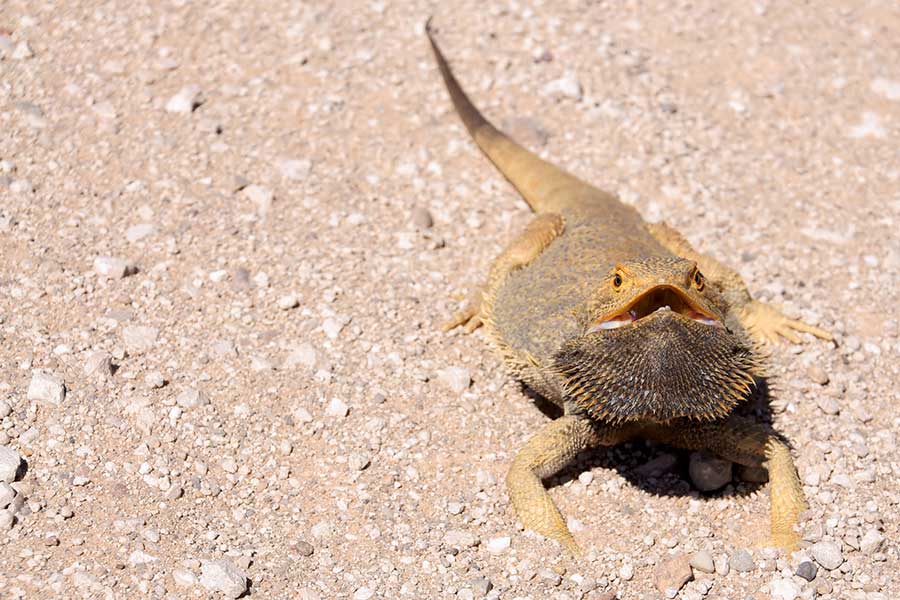
2. It's Too Moist or Not Moist Enough
Humidity is a very important factor to consider when you hear your bearded dragon cough. Bearded dragons come from Australia, so they need a very low humidity level in their enclosure.
The humidity in the enclosure should sit between 20% and 40%. This is very low and easily achievable by misting your dragon's enclosure once or twice a day.
If the humidity is too low, then the air in the enclosure is too dry. This means that the lining of your bearded dragon's lungs will dry out too, which can cause an infection and is generally uncomfortable, all of which can make your beardie cough.
If the humidity is too high, then your bearded dragon could develop respiratory tract infections very quickly, as there is too much water vapor in the air. You should have a hygrometer installed in the enclosure to monitor for excess humidity.
3. Wrong Substrate
Substrate can be a tricky part of the enclosure to get right, especially if you are a new owner. There are a range of substrates to choose from all the way from basic paper towels to fancy bioactive substrates.
If the substrate is dusty, then the dust particles will get into your bearded dragon's nasal cavities and airway and cause irritation. This irritation can lead to intense coughing and even respiratory infections.
If you want to use a loose substrate, ensure that it does not have fine dust particles in it. You should never use a sand substrate; instead, use coconut coir or forest floor bedding.
Check out this in-depth look at what bedding you should use for your bearded dragon to avoid dust!
4. Dirty Enclosure and Poor Hygiene
Bearded dragons are sensitive to their environmental conditions. A dirty bearded dragon enclosure will harbor mites, old dust, old shed, bacteria, and other nasties that can cause intestinal parasites and respiratory illnesses in your bearded dragon, which will result in them coughing.
It is important to clean your bearded dragon's enclosure regularly to get rid of all the things that can cause fungal infections and irritation, including regularly cleaning and replenishing your beardie's cleaning your beardie's tank out. Make sure you replace the substrate and clean the reptile carpet regularly.
In addition to keeping a clean home, your bearded dragon needs to stay clean, too. Regular baths in warm water help cut down on the amount of dirt inside of the enclosure and will help regulate their humidity needs, too. Check out our guide on bathing bearded dragons here!
5. Poor Diet
Poor nutrition and diet can lead to a lowered immune system and weight loss. If your bearded dragon develops a poor immune system then it will not be strong enough to fight off harmful bacterial infections, and it could develop a respiratory infection and cough.
Make sure to offer your bearded dragon a healthy and balanced diet with supplements!
Sometimes beardies just have a lack of appetite, but usually this wouldn't cause coughing.
6. Stress
Another factor that can impact your bearded dragon's immune system is stress. If your bearded dragon is experiencing stress, they can develop a respiratory infection much more easily than if they were calm and relaxed.
Common causes of stress are:
- Loud music or noise around the enclosure
- Being in a busy part of the home
- Having live food left in the enclosure
- Incorrect enclosure settings
- Being handled too frequently or roughly
- Not being handled enough
- Low activity levels and boredom
- Feeling cooped up and bored
- Not having a proper diet and proper nutrition
It is important to address any sign of stress, as it will affect your bearded dragon's lifespan.
It's important to pay attention to your bearded dragon breathing habits so you can quickly spot if something is wrong. If your bearded dragon is breathing deeply , wheezing or generally has difficulty breathing, these can also be signs of infection.
7. Infection
If you suspect your bearded dragon has an infection, you should see a vet as soon as possible. There are a few types of infection that can cause a cough, including:
- Viral Infection
- Parasitic infection
- Bacterial infection
- Fungal infection
- Respiratory infection
Some of the other signs of an infection are sneezing, discharge from their eyes and/ or nose, bubbles from the mouth or nose, shallow breathing, open-mouthed breathing, lower appetite. Any of these signs need to be treated by a vet as soon as you can.
How Do I Treat a Bearded Dragon Coughing?
To treat your beardie's cough, you'll need to identify the cause or causes. The first thing you will need to do is to check all of the enclosure settings and correct anything that is wrong. Make sure your
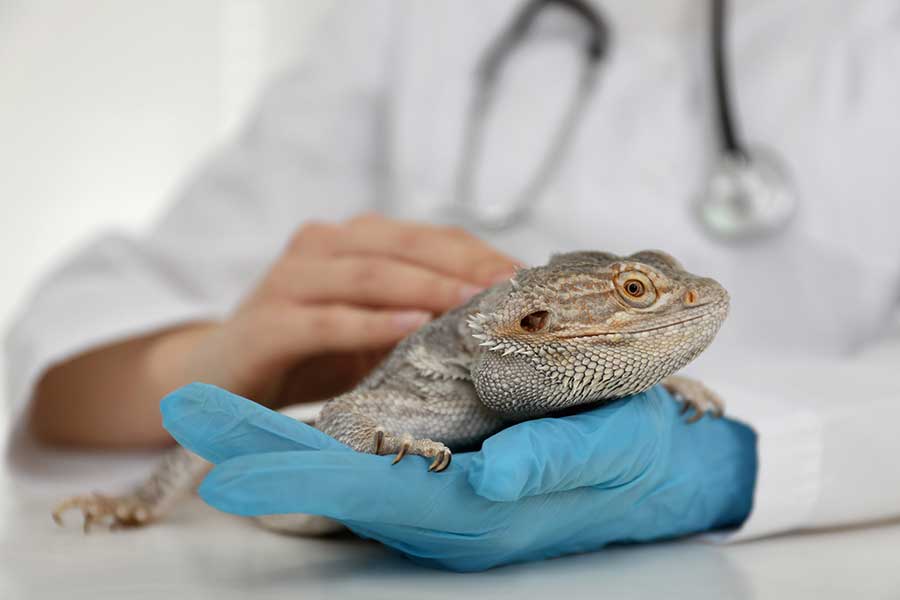
Once you have ensured that all of the enclosure settings are correct, take a look at the state your enclosure is in. If it is nice and clean, move on to the substrate. Did the last bag of substrate you purchased have a lot of dust in it, or is it breaking down into small particles?
Once you have decided that nothing in the enclosure is causing the problem, have a look at your beardie's diet. Add in some more variety and include a multivitamin if you are not sure it is as balanced as it could be.
The next stop is the vet. If your bearded dragon is coughing, blowing mucus bubbles, has a loss of appetite, diarrhea, is dehydrated, or has sunken eyes, then you need to get your dragon to a reptile vet immediately. The vet will be able to check your beardie's blood levels and make sure there isn't a serious infection.
The treatment will depend on the type of infection your pet dragon has. An infected mouth or respiratory tract may require a mouth rinse and antibiotics. Parasitic infections are generally treated with oral medication or topical cream, though these infections are less likely to cause a cough.
If the vet suspects a respiratory illness or infection, then the dragon may need a blood test, blood pressure or x-ray to see the extent of the infection. This would generally then be treated with antibiotics. A successful treatment should help to clear up infection in a couple of weeks.
It is important to note that you must not perform any self diagnosis at home. Regular veterinary check-ups will help you to avoid any issues.
Sometimes beardies will cough for perfectly normal, healthy reasons. These reasons include:
During Eating
Bearded Dragons can sometimes inhale food when eating (just like us!) and they need to have a quick cough to clear their throats
After Drinking
Again just like humans, if bearded Dragons drink too quickly, sometimes they can inhale a bit of water which they need to cough up. Make sure to replace the
After Bathing
It's important to bathe your bearded dragon now and again to keep them clean, and keep their skin healthy and hydrated. Sometimes your beardie might inhale a bit of water during the bath which they then cough up afterwards.
It's important to note that your beardie will only cough briefly if it's one of the causes above and then they will return to their normal shallow breathing. If the cough persists then it could be a sign of more serious bearded dragon illnesses or respiratory issues.
FAQs on Coughing Beardies
Bearded dragons have plenty of odd behaviors. They hiss, stomp, wave, puff up, and bob their heads at each other as a clear sign of communication. However, they do not cough at one another like some other animals do to communicate.
Bearded dragons are very quiet lizards. They don't make lots of noise like leopard geckos who chirp unless they are stressed, being aggressive, or feeling threatened.
If a bearded dragon is stuck in a situation where they feel stressed or threatened, they will puff up their beards and hiss in warning at their perceived aggressor.
If one of your bearded dragons is coughing, they likely have a respiratory infection. Respiratory infections in bearded dragons are very easily passed on to others just like humans.
Additionally, the reason your first bearded dragon developed the respiratory infection is likely down to their enclosure, which means your other bearded dragon is at risk of developing a nasty cough, too.
You will need to separate your bearded dragons and put them into separate quarantine bins until they have healed. A quarantine bin is a simple plastic enclosure with a heating pad, basking light, and water dish.
While your bearded dragons are in quarantine, you will need to do a full sanitization of the original enclosure to ensure that whatever made them sick in the first place does not make them sick again when you put them back.
At the Tail End of Things…
When your bearded dragon is coughing, might be immediate cause for alarm. The cough could be an indication that something is very wrong in their enclosure, and their respiratory system is either irritated by it, or they have a severe infection.
However, your dragon could also just be regurgitating some food, which is healthy dragon behavior.
Make sure all enclosure settings that impact the respiratory system are correct – that means ensuring the optimum temperature, correct humidity, and suitable substrate. Double-check that your bearded lizard is getting a well-balanced diet and they are getting all the nutrition they need.
A visit to the vet may be in order so your bearded dragon can get a round of antibiotics to fight off any infection if needed. We want our scaly friends to have healthy lives, so if you are worried, make sure you get your pet over to the vet.

